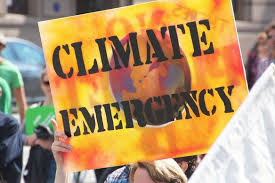Republic of Ireland declares Climate Emergency
Republic of Ireland has become only the second country in world to declare a climate emergency. Earlier on 1 May 2019, Britain’s parliament became the first in world to declare a climate emergency.
Key Highlights
- The climate emergency declaration was passed by both the government and opposition parties of Ireland unanimously. Both agreed to an amendment to ‘Oireachtas report on Climate Action’ (a parliamentary report on climate action). The ammendement was accepted without a vote.
- Targets: to be undertaken includes- becoming carbon-neutral by 2030, introduce electric car hubs or build sustainable homes to try to achieve that goal.
- The Oireachtas Climate Action report that started the Irish declaration came from a Citizens’ Assembly report. The Citizens’ Assembly will next be considering the issue of a biodiversity emergency.
- The Citizens’ Assembly: It is the Ireland’s citizens’ assembly which was established in 2016 for considering several political questions like referendums, abortion, population ageing, fixed term parliaments, and climate change etc. The report produced by it to be considered by the Oireachtas (Ireland’s Legislature).
- Next Move: The Ireland will next vote on a Climate Emergency Measures Bill, which seeks to limit oil and gas exploration.
- Criticism: declaring a climate emergency will mean absolutely nothing unless there is action taken to back it up. Also, there is no single definition of what a climate emergency actually means.
Ireland Legislature
- The national parliament of Ireland is known as Oireachtas. It consists of, The President of Ireland and a bicameral chamber. It is the only body that has power to make laws.
- The two houses of Oireachtas are
- Dáil Éireann (lower house)
- Seanad Éireann (Upper House)
About Britain’s Protest
- Britain declared the climate emergency following the 11 days of street protests led by ‘Extinction Rebellion’ environmental campaign group in London, UK.
- The ultimate goal of Extinction Rebellion’s is to cut down global greenhouse gas (GHGs) emissions to zero by 2025 and to end biodiversity loss.
- They have won the support of left-leaning politicians across the world.
- The British government targets include reducing its carbon emissions by 80% (compared to 1990 levels) by 2050. It seeks to achieve the target at a relatively low cost and without causing substantial economic damage.
Others
- The targets are being set in Scotland to reduce its greenhouse gas (GHG) emissions to net-zero by 2045.
- Many local areas around the United Kingdom (UK) have also acknowledge that there is a climate emergency.
Month: Current Affairs - May, 2019


